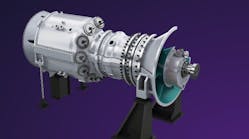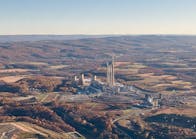Forecast: Hydrogen Energy Storage accelerating to $119B global market value by 2027
Hydrogen has no natural odor, but it's definitely attracting the scent of money.
A number of massive and worldwide projects is elevating the small but energy intensive element to 12-digit fiscal status over the coming years, if analysts are right. Research by MarketsandMarkets forecasts that the hydrogen energy storage market alone will grow from its current $13.8 billion standing to nearly $120 billion by 2027.
MarketsandMarkets sees an annual compound growth rate of 54 percent over those five years.
Rising demand for stationary and mobile applications, such as hydrogen fuel cell for transportation, will drive the H2 storage market, according to the research summarized here. EnergyTech has posted stories about H2 fuel cell projects and pilots involving companies such as GKN, Plug Power, Bloom Energy and Mitsubishi Power.
ABB and General Motors both have announced plans for hydrogen-fueled generator sets to serve backup power duties for mission critical energy markets such as the military and medical care facilities.
Read more on H2 here
GKN Hydrogen, SoCalGas work NREL to deploy Green H2 Storage
Nel Hydrogen building Elecrolyzer for Biotech firm Solar Foods in Finland
Caterpillar leading H2 CHP Demonstration
GM expanding Hydrogen Gen-sets into Mission Critical Onsite Power markets
Hydrogen is desired as a baseload and backup fuel resource because it does not emit carbon dioxide when combusted. However, H2 is not naturally mined and must be isolated and collected through several processes which can be carbon intensive.
One of those methods to create usuable hydrogen is steam reforming of methane natural gas, or separating the H2 atoms from the methane (which combines four hydrogen atoms with one carbon atom). Another is electrolysis, which uses electric current to isolate the H2 from water. To be considered truly “green hydrogen,” the electrolyzers should be powered from electricity by carbon-free resources such as wind, solar, hydro or nuclear.
Some power industry original equipment manufacturers (OEMs) such as Siemens, Mitsubishi and GE are experimenting with hydrogen mixes in their gas-fired turbines.
The biggest hydrogen storage project in the world is currently being developed in Delta, Utah. The Advanced Clean Energy Storage project, once realized, would store up to 1,000 MW of H2 power capacity in underground salt caverns.
ACES is a joint venture between Mitsubishi Power Americas and Magnum Development and has received a $500 million debt commitment from the U.S. Department of Energy. It would also provide fuel for the Intermountain Power Agency power plant project nearby.
Read more on the ACES, Intermountain Power projects
Subscribe to our free newsletter for Insights into the C&I and Mission Critical Energy Transitions
Intermountain Power Plant would start the hybrid gas turbine using a smaller percentage of hydrogen with the methane, but eventually grow that to 100 percent H2 by the coming decade.
One of hydrogen's key values is it has a longer energy storage duration than battery technologies, according to the MarketsandMarkets research summary. It can be stored in tanks, as a liquid once it is chilled to below minus-250 degrees Celsius, or in the underground salt caverns.
Other major global players in hydrogen storage and technologies include Linde, Air Liquide and Fuel Cell Energy.
-- -- --
(Rod Walton, senior editor for EnergyTech, is a 14-year veteran of covering the energy industry both as a newspaper and trade journalist. He can be reached at [email protected]).





